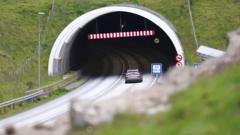The political coalition between South Africa’s African National Congress (ANC) and the Democratic Alliance (DA) faces significant challenges as they navigate public disputes and ideological differences, all while trying to maintain stability before upcoming elections.
South Africa's Political Coalition: Strained Ties Persist in Uncertain Times

South Africa's Political Coalition: Strained Ties Persist in Uncertain Times
As internal conflicts rise within South Africa's coalition government, leaders from the ANC and DA face mounting pressures while desperately avoiding separation.
Article:
South Africa's political dynamic showcases a fraught yet essential alliance between the African National Congress (ANC) and the Democratic Alliance (DA), who find themselves in a partnership characterized by discomfort but a reluctance to part ways. Despite the evident strain, both parties recognize that a split could lead to electoral disadvantage, putting the interests of South African voters at risk.
Formed after last year's elections when the ANC lost its parliamentary majority, the Government of National Unity (GNU) was intended to be a collaborative beacon of stability. However, it has devolved into a battleground marked by animosity and discord rather than jubilant celebration. This uneasy coalition has seen both President Cyril Ramaphosa of the ANC and John Steenhuisen of the DA navigating a complicated relationship, obscured by public disputes and rival ambitions.
The partnership, though fraught with challenges, has occasionally yielded positive results. A notable example was their united front during a controversial meeting with former US President Donald Trump earlier this year, which showcased the potential benefits of their collaboration. Nevertheless, it is evident that differing ideologies are a source of persistent tension, with each party exerting influences that occasionally clash.
Recent turmoil escalated following the controversial dismissal of DA deputy minister Andrew Whitfield, which triggered a public outcry from Steenhuisen, who criticized the ANC’s unilateral decision-making. The stakes are high as issues about land expropriation and proposed tax hikes escalate tensions further within the coalition, highlighting the complexities of working across ideological lines.
Analysts believe this coalition functions as a strategic partnership, particularly for the DA, which aims to retain its influence and curb more radical opposition forces. However, both parties face internal challenges: the ANC is grappling with factions that are discontented with an alliance they view as incompatible with their goals, while the DA's dual role blurs the lines between opposition and governance.
As the political climate grows increasingly unstable, the potential for fractures in the coalition looms. Steenhuisen has indicated a growing lack of confidence in Ramaphosa's leadership, raising the possibility of a motion of no confidence being tabled by the DA in parliament—underscoring the precarious nature of their alliance.
Moving forward, both leaders must navigate their differences carefully; a split, they have determined, would only deepen voter discontent and jeopardize their political futures. The coalition remains a fragile alliance, one that must prioritize communication and cooperation in the midst of discord, or risk falling apart entirely in the face of mounting pressures from both the public and their political bases.
South Africa's political dynamic showcases a fraught yet essential alliance between the African National Congress (ANC) and the Democratic Alliance (DA), who find themselves in a partnership characterized by discomfort but a reluctance to part ways. Despite the evident strain, both parties recognize that a split could lead to electoral disadvantage, putting the interests of South African voters at risk.
Formed after last year's elections when the ANC lost its parliamentary majority, the Government of National Unity (GNU) was intended to be a collaborative beacon of stability. However, it has devolved into a battleground marked by animosity and discord rather than jubilant celebration. This uneasy coalition has seen both President Cyril Ramaphosa of the ANC and John Steenhuisen of the DA navigating a complicated relationship, obscured by public disputes and rival ambitions.
The partnership, though fraught with challenges, has occasionally yielded positive results. A notable example was their united front during a controversial meeting with former US President Donald Trump earlier this year, which showcased the potential benefits of their collaboration. Nevertheless, it is evident that differing ideologies are a source of persistent tension, with each party exerting influences that occasionally clash.
Recent turmoil escalated following the controversial dismissal of DA deputy minister Andrew Whitfield, which triggered a public outcry from Steenhuisen, who criticized the ANC’s unilateral decision-making. The stakes are high as issues about land expropriation and proposed tax hikes escalate tensions further within the coalition, highlighting the complexities of working across ideological lines.
Analysts believe this coalition functions as a strategic partnership, particularly for the DA, which aims to retain its influence and curb more radical opposition forces. However, both parties face internal challenges: the ANC is grappling with factions that are discontented with an alliance they view as incompatible with their goals, while the DA's dual role blurs the lines between opposition and governance.
As the political climate grows increasingly unstable, the potential for fractures in the coalition looms. Steenhuisen has indicated a growing lack of confidence in Ramaphosa's leadership, raising the possibility of a motion of no confidence being tabled by the DA in parliament—underscoring the precarious nature of their alliance.
Moving forward, both leaders must navigate their differences carefully; a split, they have determined, would only deepen voter discontent and jeopardize their political futures. The coalition remains a fragile alliance, one that must prioritize communication and cooperation in the midst of discord, or risk falling apart entirely in the face of mounting pressures from both the public and their political bases.



















